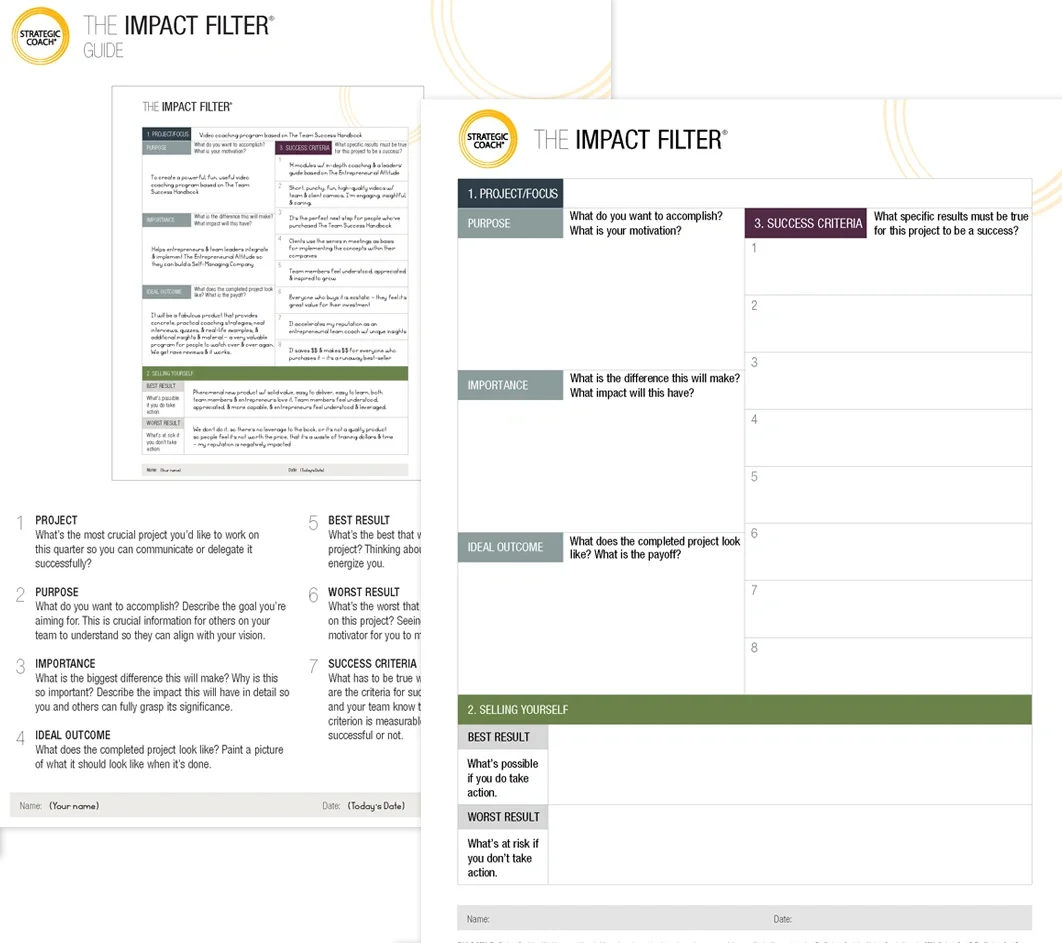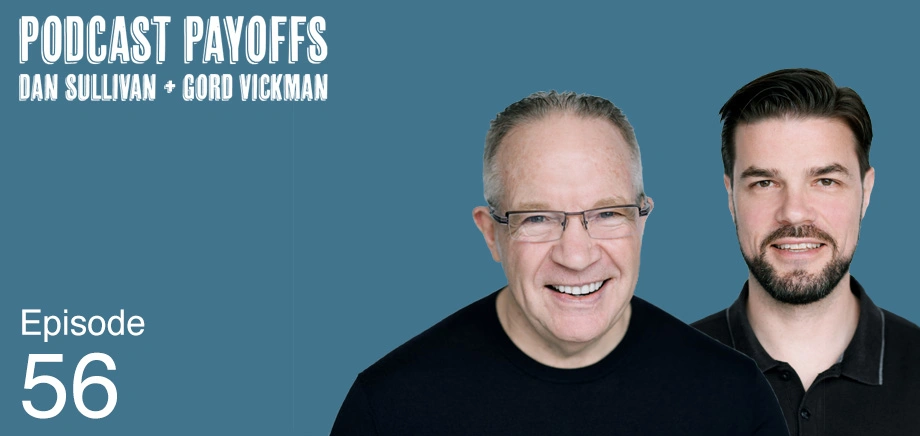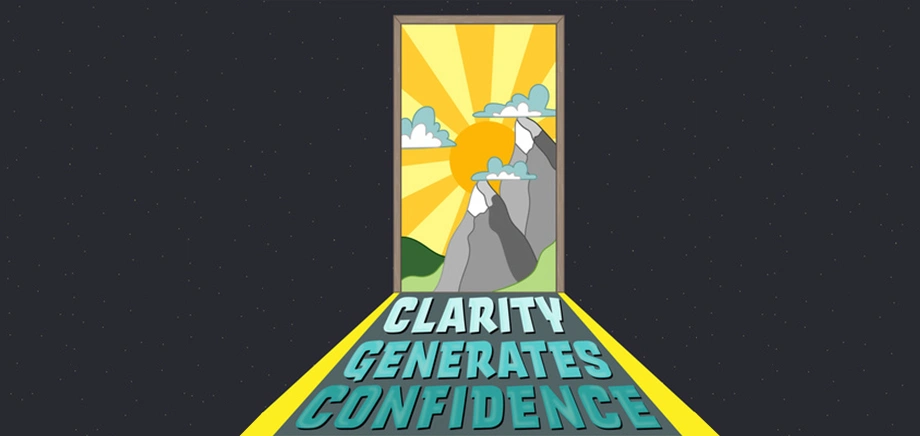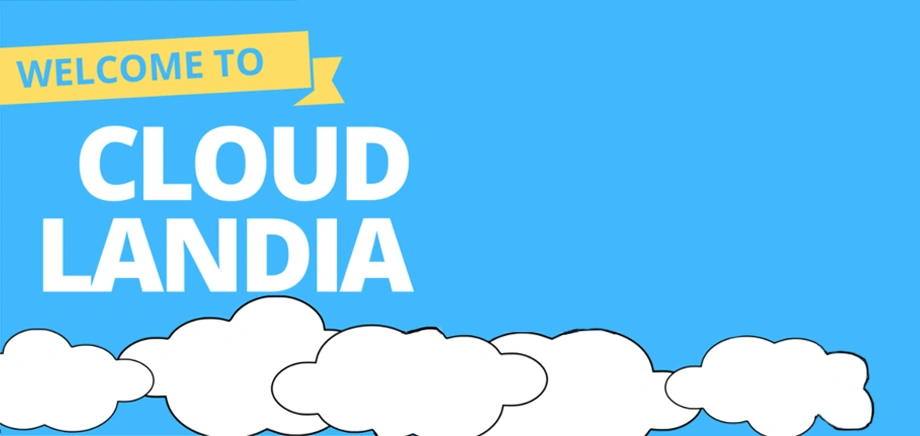Is It Tough To Make A Buck?
July 09, 2024
Hosted By
 Dan Sullivan
Dan Sullivan
 Gord Vickman
Gord Vickman
There's a misconception that podcasting is a quick way to make money. But if you're only in it for the cash, you'll likely be disappointed. Start a podcast for the right reason: to create value for your audience. When you focus on creating great content for your listeners, the money may show up in other ways. Dan Sullivan and Gord Vickman explain how Strategic Coach® has seen consistent growth for decades by doing just that.
In This Episode:
- Most entrepreneurs develop the courage to become entrepreneurs because they’re good salespeople.
- Marketing is what allows you to have the opportunity to be in front of someone.
- If you see a problem, set out to solve it, whether you get paid for it or not.
- You should do it because it’s valuable, regardless of the money you make.
- Don’t listen to the people who are trying to throw you into “The Gap” by saying, “Oh, you must do this because everyone else is doing it!”
- Don’t force people to learn something new in order to get value from you.
- A podcast is like a message in a bottle. Most will sink, but others wash up on a beach where somebody will read it and say, “I’ve been looking for that!”
- Existing clients listen to our podcasts faithfully. They come to the workshops and talk about the subjects that the podcasts cover.
- The goal of the Strategic Podcast Network is to attract people and marinate them in the content in the hopes that they become successful, talented, ambitious entrepreneurs.
- It’s not tough to make money if your focus is on making other people successful.
Resources:
The Strategic Podcast Network features all our shows in one place
10xTalk podcast, featuring Dan Sullivan and Joe Polish
Joe Polish’s Genius Network®
Inside Strategic Coach podcast, featuring Dan Sullivan and Shannon Waller
Episode Transcript
Gord Vickman: Welcome to Podcast Payoffs. My name’s Gord Vickman, here with my pod partner, Strategic Coach co-founder, Dan Sullivan.
Dan, I’m going to throw something at you here. I know you can handle this. And you can interpret this question however you’d like, but you’ll see how if you stick with us for this episode, we’re going to bring it all home and it will answer a question that has to do with money.
Dan, very simply, is it tough to make a buck?
Dan Sullivan: Well, certainly it is for a lot of people and people I know, people I grew up with. And I’ve never had a particular problem with it. My biggest problem was keeping the bucks that I made. So I needed superior skill in my life to actually say, “Dan, give me the money and I’ll make sure that it does good for you.”
And I think the reason is that I’ve had a nose for opportunity that started very, very early.
I grew up on a farm, so I didn’t really have any experience of making money of my own on the farm until we left the farm when I was 11 and we moved into a small town. And then within a very short period of time, I had done paper routes. Two main things, were paper routes and cutting lawns. And the third thing was caddying.
I really made a ton of money for a 15-, 16-year-old when I was a caddie. I remember one weekend, and this was before electric carts, so you had their bags and your shoulder. And I’ve always been good at lifting things so I would do two bags for 36 holes on a Saturday, and two bags for 36 holes on a Sunday.
So 72 holes, two bags. And you got paid about $5 per nine, so that’d be $10, $40. And then you’d had tips. They could be as much as 30%. So I made $40 plus 30% would be, was that 50? So I probably cleared a hundred dollars on the weekend. This is 1958, 1959. And that was more than my father brought home that week.
Gord Vickman: Wow.
Dan Sullivan: And that was just working two days. That was just working two days. And I was in great shape from it. I was nicely tanned and everything like that. And all that caddying convinced me I was never going to do this as a pastime. And I said, “I can’t imagine.” Knowing my later concept of “The Gap,” I’ve never seen a sport that puts you in The Gap so fast and keeps you in The Gap as golf.
Gord Vickman: It’s one thing we have in common, Dan, is I think from the ages of about 11, I also had a paper route in Sudbury, Ontario. Delivered the Northern Life. Shout out to anyone in Northern Ontario. You’ll remember that paper. It’s now defunct because it was not making any money. I also cut grass, I cleaned pools, cleaned pools, mowed lawns, worked in a nickel mine, flipped burgers, worked in a hardware store. From the age of 12 to 22, I had more jobs than I had hot meals.
But that was just the way it is. So why do I bring this up? What do the jobs of our youth have to do with Podcast Payoffs and the intersection of teamwork and technology? The reason I ask is if it’s tough to make a buck is because that’s the common refrain you hear. So I was down in Dallas, Texas this past summer for the Podcast Movement Conference, and I knew what was going to be discussed there because it’s one of the main topics.
Yeah, technology’s big and people talk about marketing, but monetization. Okay? How do you make money from your ideas? Our friend, Joe Polish, you do a podcast with him, Dan. It’s called “10xTalk”. It’s a wonderful podcast. You can check that out on our network page, strategicpodcasts.com or just “10xTalk.com”. Joe says, “If you don’t pay, you don’t pay attention.” But is there a way, Dan, that you’ve used historically throughout your career, whether it’s instinctual or some technique that you’ve learned to give yourself some kind of inclination that other people can use that they’re actually onto something? I’m going to be launching a podcast, but I don’t know if anyone’s going to listen. Is there something that you use? Is there a secret sauce or a formula? Dan Sullivan: Yeah. It’s a good question, and I been pondering it quite a bit at the Free Zone level, because we have the highest level of Strategic Coach, and usually, entrepreneurs have done probably six, seven years before they go to the Free Zone. And that’s where you put the Unique Ability of your company together with the Unique Ability of another company, and you put them together and you create new value for the same client.
In other words, if you think of the world from a client or customer’s viewpoint, they live in a 360-degree world and they need lots and lots of different problem-solvers in their life, their personal life, their business life.
So what you look for is one of the other problem-solvers that creates value for the same person that you’re creating value for, and then you put your capability together with ours. And Joe Polish is a good example, because he’s got a wonderful program called Genius Network that really teaches entrepreneurs marketing, in-depth marketing.
His approach is in every dimension of marketing. And I’m fascinated for myself because I’m a good salesperson. And I think that most entrepreneurs develop the courage to become entrepreneurs because essentially they’re good salespeople. In other words, if they’re in front of somebody, they can sense what this person would really like to buy, and you can convince them to try you out.
But that’s not marketing. Marketing is what gets you to even have the opportunity to be in front of someone. Okay. So for example, with our podcast, one of the reasons why I think, when we went virtual during COVID with the Program on Zoom is that the people to come in were people from overseas. They were all around the planet, but they had already been listening to the podcast. They already had a relationship with us. But the difficulty and the hassle of actually joining the Program because of travel and time zone was just too difficult. But we solved the problem by taking the travel away. We took the distance away. But we already have been creating value for them for free for four or five years.
And I’d like to relate that back to going to the podcast conference. They’re asking the question because they’re making the whole venture of podcasting about them and not about the listener. So my attitude was, do you want to share something that’s really valuable with someone else, whether you get paid for it or not?
Because you’ve asked a great question, and it’s only been recently that I actually have the answer and I tell people, “I volunteer whether I get paid for it or not. If I see a problem that can be solved, I’ll solve the problem whether I get paid for it or not.”
Gord Vickman: Is that something you had to learn or have you always been like this?
Dan Sullivan: No, no, I’ve had it. Well, first of all...
Gord Vickman: Factory installed.
Dan Sullivan: You grow up in a farm family in the 1940s and Fifties, and you’re just making it as a family. I mean, you’re just getting by as a family. There’s a lot of things that you can do that, I mean, you’re going to get paid with intangibles, you’re going to get praise and everything else, which is a form of payment.
And I just developed a nose—do it whether you get paid for it or not, be valuable whether you get paid for it or not. And so that’s my general attitude. And so many of the people I find when I go to marketing conferences, they’re only thinking about themselves. And if they were using a podcast, it would be all teasing, they wouldn’t actually give the value.
They would put out teases that, “If you really want to go deep in this, then I’ve got a little course and all you have to do is click here. And for $49.95, I’ll give you the whole thing.” But there’s actually no value in their messaging. There’s no value. It’s just teasing. And a lot of what marking is about is how to tease people without knowing that you’re tricking them.
And I bet there was a lot of that at the podcast. And the reason is that you’re just putting out stuff that is based on fear, in other words, “If you miss this, you’re going to lose out. If you don’t send me 50 dollars, you’re going to be left behind and left out and everything.” And so much of it is fear and pain.
“Podcasting industry is exploding. You got to know the tricks of podcasting. If you don’t know the tricks of podcasting, you’re just going to be chopping your lips, so.” And I’ve never thought that that was a general approach to life in general. And I don’t feel it’s a general approach to how you make bucks that, after a while, are based wholly on quality of value that you’re creating.
Gord Vickman: Totally agree. And there are certain podcasts consultants, and there are people who, they’ve created a brand around, I call it “drive-by idea generation,” where part of their brand is, they want to be the first person to tell everyone about some new technology. So they drive by and they spray out the car window, paint-balls to keep it peaceful, of ideas.
And some people will internalize this kind of information and think to themselves totally in The Gap. Okay? They’re so Gapped-out in regards to the way they process this like, “I’m not doing this, I’m not doing that. I’m not doing this. Okay. Well, then that’s it. My podcast is trash and I’m never going to get paid for this because I’m not doing this, this, this, this, this.”
Dan Sullivan: Yeah.
Gord Vickman: Now notwithstanding, half of this stuff came out two weeks ago, and the person who’s telling you that you need to do this yesterday doesn’t even fully understand it right now. At that conference they were talking about YouTube, YouTube. “Oh, you got to get on YouTube. You got to. Every podcast has to get on YouTube. On YouTube.”
Well, first of all, I’m sitting here as a Canadian and I’m thinking, “We’re geo-locked out of the YouTube podcast thing. It’s in beta. They haven’t even let us in yet.” Second of all, if you don’t have the bandwidth and you don’t have the people-power, you don’t have the budget to do a full-throttle produced video podcast and audio is what you are capable of right now, do what you can with the resources you have available.
Dan Sullivan: Yeah.
Gord Vickman: And then once you grow, then elevate and go on YouTube. But no, you’re not garbage and you’re not doomed to be unsuccessful.
Dan Sullivan: Yeah.
Gord Vickman: If you’re not doing a Rogan-type show. Maybe you can’t afford a camera right now, and you’re just starting out. Do what you can with what you have available and don’t listen to the people who are trying to throw you into The Gap by saying, “Oh, you must do this, this, this, this, this, this right now, otherwise you’re never going to be successful.”
It’s too hard to keep up. There’s too many things. I’ll give you that quick example, Dan. There was a company that, I can’t remember their name. So you have, picture yourself holding your iPhone. You have your Apple AirPods. So they can monitor your phone, they can figure out what your head is doing.
So there’s a company that’s figured out how to announce via a podcast that if you want more information on something, simply nod your head. So for example, let’s say we were implementing and employing this technology, we could say, “Do you want Dan’s new quarterly book, You Are Not a Computer? Just nod.” So your AirPods tell your phone that you just nodded. And then when you go back to your phone, a tab will be open.
Dan Sullivan: There it is.
Gord Vickman: There it is right there. Then I’ll categorize this very firmly into, that’s cool and fun, but…
Dan Sullivan: So the thing is, don’t ask people to learn something new to get value from you. Don’t ask them to change their habits. People will willingly change their habits, but they won’t be coerced to change their habits.
Gord Vickman: That’s true. And Dan, you’ve said many, many times, technology does not coach itself.
Dan Sullivan: No.
Gord Vickman: IT and coaching, the two fastest growing industries in the world. But you need coaching through that IT, that’s one piece of the puzzle that’s sorely lacking from the technology that I’m seeing coming out right now. People want to embrace these new things. I’m positive there was someone listening to that representative of the spacial audio company that I told you about where the guy said, “You’re going to be able to nod and people are going to bring up tabs on your phone to sell products.” Someone out there right now probably left that presentation very dejected because they don’t know how they’re going to implement this into their podcast that makes, I don’t know, no money, or maybe $14 a month. It’s like, “Don’t worry about it, man.”
Dan Sullivan: Yeah.
Gord Vickman: Don’t worry about... Let’s get the fundamentals down here before you start implementing and bringing in spatial awareness kind of stuff. Just take a step back here and focus on producing a show that people want to listen to in the first place, and then these other monetization ideas.
People think I’m an alien from outer space when I go to these things because when they start getting into the conversation of how do you monetize, I say, and I’m trying to be sarcastic here. They’re like, “Well, how are you monetizing?” I’m like, “I don’t know.
Dan Sullivan: We make our money with people writing very, very big checks. Okay? So we can have something in our activities backstage. We’re backstage now. We can have something that at the end of the year costs $200,000.
But if we get 10 people, of all the listeners, and we have millions and millions of listeners from all the podcasts, if we have 10 people who are really attracted to us and they call us up and they go through the whole process and they register in the Program—well, the lifetime value of every one of our registrations is $40,000. So we pay $200,000 and we get $400,000 back. So it is calculated. But we know that podcasts are messages in the bottle that you throw a million bottles out into the ocean and some of them are swallowed by...
Gord Vickman: Great white sharks.
Dan Sullivan: Some of them spring a leak. But there’s a certain number of them that are going to come up on a beach and somebody’s going to pick up, read the message and say, “I’ve been looking for that.”
But we have really great trees in our yard and we have maples and we have oaks, and boy, oak trees waste a lot of acorns. And maple trees, those little winged messengers that maple trees send out there? Every tree must send out millions and millions of these. And the chances of one of them growing into a maple tree are very small. They say, “Gee, they should try another way. They should just have a big acorn.”
Gord Vickman: That weighs 40 pounds. And if it lands on your head...
Dan Sullivan: We can catapult it. Yeah, no. But we do know that the existing clients listen to the podcasts faithfully. I mean, each of them has at least one very favorite podcast series. Some of them listen to five different series and they really enjoy it. And they come to the workshops and they talk about the subjects that we cover.
And we also know that on our image around the world, we know our podcasts are establishing a very positive image about who we are. And we do know that it establishes a relationship that, for the right person, it encourages them to join the community.
Gord Vickman: And we keep the themes internal and we keep things on-brand and on-message. Because like I mentioned before, when I said I was being a little bit sarcastic when I said, “We don’t care about monetization.” We certainly care about monetization, but it’s not in the sense that other people do. So we’re not trying to attract the mattress companies, the food boxes, the God knows what else people are selling on podcasts these days, because we’re talking multi-billions of dollars. But we leverage our shows. They sit right at the top of our funnel.
People are marinated in your thoughts, the thoughts of Strategic Coach, in the show you do with Shannon Waller, Dan, Inside Strategic Coach. A lot of people, that’s their first entry into the world of Strategic Coach and the thoughts of Dan Sullivan. And then we use our dynamic ads off each show to link back to our Knowledge Products.
So everything stays internal, but it’s all for the same purpose, which is to attract people to the thinking, feeling, marinate them in what we’re doing here, in the hopes that once they become successful, talented, ambitious entrepreneurs, they’ve already been marinated in your thoughts and what we’re up to and would be much more likely to at least discuss participating in one of the workshops. So we’re playing the long game here. This is a marathon, not a sprint.
Dan Sullivan: Yeah.
Gord Vickman: And we have been asked before numerous times, there are people who want to advertise on our shows, but the answer is always no, politely, because it’s not in the spirit of what we’re trying to do here. It would sound so weird if in the middle of one of our shows, it would just cut out and then we start, I don’t know, trying to sell pork tenderloin over the mail.
Dan Sullivan: Yeah.
Gord Vickman: It doesn’t fit.
Dan Sullivan: Yeah. And then people want the contact information of our clients. And no, the answer is no. We don’t share our contact information with anyone.
I think you just put your finger on the thing. We play a long game and you have to have good cash flow confidence.
So we didn’t start our company through podcasts. We started podcasting when our company was 25 years already successful and well-known, well-known before we started our podcasting. See, a lot of people want to go into podcasting is that’s the beginning of their business. “I’ll get an audience and then I’ll start selling things to the audience in my podcasting, so.”
And I don’t think podcasting is a good device to start a new business with. I’d choose direct mail over it. I mean, direct mail is still the single most cost effective, efficient, and productive and profitable form of marketing communication.
Gord Vickman: I read that as well. And the reason, nobody does it.
Dan Sullivan: Yeah. The reason why it works so well is that nobody does it. But if people have the COVID experience that they were at home. So a lot of people had the experience that they were home when the mailman came and they looked at every piece of mail when it came through the slot. That’s not true of every email. And you look at it and you say, “Gee, that’s the whole point of marketing, is to get people to be conscious of you.”
Gord Vickman: It’s funny, we got a piece of direct mail in the mailbox just the other day. My wife and I had been discussing getting a new mattress. Ours is about a decade old. And I said, “You know what? Let’s get a little refresh here. Why not?”
Dan Sullivan: Yeah.
Gord Vickman: You’re in bed for one third of your life. We’re talking about different kinds of mattresses, whatever. And then two days later we got a direct mail postcard in the mailbox for mattresses.
Dan Sullivan: Yeah. We got one that was just a door-to-door delivery where they hire people to just go around deliver. And it was an Indian restaurant on Queen Street just as you get over Don Valley going East. And it was kind of like beautiful. And they had their complete menu on it. So Babs said, “You know, I’m kind of bored with what we have here. Why don’t we just get in the car and go?”
We phoned them up, I said, “Are you takeout only?” And they said, “No, no, we’ve got room for about 20 people, but that most people do pick up. There will always be seats. So anytime you come there’s going to be seats.” And the food was really good. They had a lot of variety and everything like that. And then that was a printed piece that came through our mail lot. So I said, “That’s cool.”
Gord Vickman: And we just might buy a mattress from the company...
Dan Sullivan: Yeah. Yeah.
Gord Vickman: That put a direct mail piece of mail.
Dan Sullivan: Yeah.
Gord Vickman: It’s funny, after that I asked my wife, I said, “Were the windows open when we were speaking about the mattress the other day?” She said, “Why?” I said, “Check this out.” And I don’t remember getting a mattress direct mail at any point in time. Maybe it’s that confirmation bias, like you buy a green car and all of a sudden you see green cars all over the place. But...
Dan Sullivan: Yeah.
Gord Vickman: I don’t know. I put another layer of shine on my tinfoil helmet after that. And then we close all the windows next time we’re talking about any major purchase because they’re listening.
Dan Sullivan: So anyway, just to answer your question that you opened with, “Is it tough to make a buck?” I said, “It’s not tough to make a buck if your focus is on how do other people make a buck with your help, how do other people become successful with your help.” Okay?
I mean, if you’re making other people successful, I think it’s a byproduct that you’ll be successful. Because the word will go around. But if you’re the one-in-10-million person who invents a new something technologically and then everybody says, “See what that person can do.” Then I said, “It was one out of 10 million. Why don’t you look at the other 9,999,000 who didn’t make it?” We always get the wrong lesson from success stories.
Gord Vickman: Stick to the basics and...
Dan Sullivan: Create value.
Gord Vickman: Create value.
Dan Sullivan: Yeah.
Gord Vickman: Profit is created ethically by creating value. And...
Dan Sullivan: Yeah.
Gord Vickman: Focus on them, not on you.
Dan Sullivan: Yeah.
Gord Vickman: Maybe that’s what some podcasters are missing out on. It’s not about...
Dan Sullivan: Yeah.
Gord Vickman: “How do I make money?” It’s “How do I serve the community that I’m speaking to better than anyone else?” And then from there, provide goods and services to them that would be relevant to their lives.
Dan Sullivan: Yeah. Be someone that other people would like to get to know. Show up on time. Do what you say. Finish what you start. Say please and thank you.
Gord Vickman: The four Referability Habits will take you very far in life. So will expanding your horizons by listening to podcasts that are of interest to you and consuming that education. And we hope you enjoyed the education that you received here today. We hope you enjoyed the show. If you did, we’d love it if you could tell one friend or two friends.
Tell five friends if you think there’s someone in your life that could enjoy this and get some value out of it as well. You could be a hero today to that person just by sharing the show with them if there’s something that they really need to hear.
And as always, you can check out the show notes for this. Anything that we talk about, whether it’s tools, tips, links, resources, YouTube videos, other podcasts, we’ll never make you search for them.
On the episode page Podcast Payoffs, just go to strategicpodcasts.com, click Podcast Payoffs and everything you would like to know or dig deeper on this episode is available for you there as well as all of our other podcasts are similar as well. We won’t make you hunt for anything, we’re going to give it to you on a platter with a bow. And I can’t think of a better spot to wrap up than that, Dan. Any final thoughts?
Dan Sullivan: Nope. That’s good for me today, but great topic because it relates to everything in life, not just business and not just podcasting. There’s things that have been known for thousands of years and they always become valuable in the present because everyone else either didn’t learn them or has forgotten about them.
Gord Vickman: Thanks a bunch, Dan.
Dan Sullivan: Thank you, Gord.
Related Content
The Impact Filter®
Dan Sullivan’s #1 Thinking Tool
Are you tired of feeling overwhelmed by your goals? The Impact Filter is a powerful planning tool that can help you find clarity and focus. It’s a thinking process that filters out everything except the impact you want to have, and it’s the same tool that Dan Sullivan uses in every meeting.







